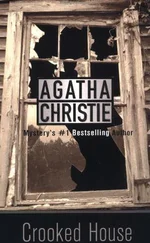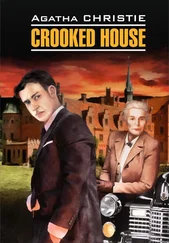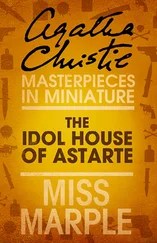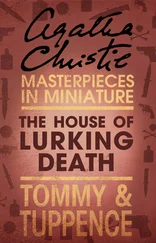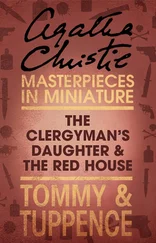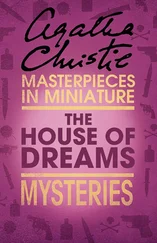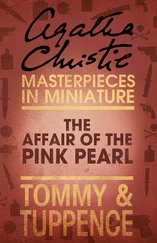Agatha Christie - Peril at End House
Здесь есть возможность читать онлайн «Agatha Christie - Peril at End House» весь текст электронной книги совершенно бесплатно (целиком полную версию без сокращений). В некоторых случаях можно слушать аудио, скачать через торрент в формате fb2 и присутствует краткое содержание. Жанр: Классический детектив, на английском языке. Описание произведения, (предисловие) а так же отзывы посетителей доступны на портале библиотеки ЛибКат.
- Название:Peril at End House
- Автор:
- Жанр:
- Год:неизвестен
- ISBN:нет данных
- Рейтинг книги:3.5 / 5. Голосов: 2
-
Избранное:Добавить в избранное
- Отзывы:
-
Ваша оценка:
- 80
- 1
- 2
- 3
- 4
- 5
Peril at End House: краткое содержание, описание и аннотация
Предлагаем к чтению аннотацию, описание, краткое содержание или предисловие (зависит от того, что написал сам автор книги «Peril at End House»). Если вы не нашли необходимую информацию о книге — напишите в комментариях, мы постараемся отыскать её.
Peril at End House — читать онлайн бесплатно полную книгу (весь текст) целиком
Ниже представлен текст книги, разбитый по страницам. Система сохранения места последней прочитанной страницы, позволяет с удобством читать онлайн бесплатно книгу «Peril at End House», без необходимости каждый раз заново искать на чём Вы остановились. Поставьте закладку, и сможете в любой момент перейти на страницу, на которой закончили чтение.
Интервал:
Закладка:
'Not necessarily. It is very largely a question of leverage. Oh, yes, it could be done.'
He continued his slow pacing up and down the room.
'Anyone who was at End House last night comes under suspicion. But those guests-no, I do not think it was one of them. For the most part, I should say, they were mere acquaintances. There was no intimacy between them and the young mistress of the house.'
'Charles Vyse was there,' I remarked.
'Yes, we must not forget him. He is, logically, our strongest suspect.' He made a gesture of despair and threw himself into a chair opposite mine. 'Voila-it is always that we come back to! Motive! We must find the motive if we are to understand this crime. And it is there, Hastings, that I am continually baffled. Who can possibly have a motive for doing away with Mademoiselle Nick? I have let myself go to the most absurd suppositions. I, Hercule Poirot, have descended to the most ignominious flights of fancy. I have adopted the mentality of the cheap thriller. The grandfather-the "Old Nick"-he who is supposed to have gambled his money away. Did he really do so, I have asked myself? Did he, on the contrary, hide it away? Is it hidden somewhere in End House? Buried somewhere in the grounds? With that end in view (I am ashamed to say it) I inquired of Mademoiselle Nick whether there had ever been any offers to buy the house.'
'Do you know, Poirot,' I said, 'I call that rather a bright idea. There may be something in it.'
Poirot groaned.
'You would say that! It would appeal, I knew, to your romantic but slightly mediocre mind. Buried treasure-yes, you would enjoy that idea.'
'Well-I don't see why not-'
'Because, my friend, the more prosaic explanation is nearly always more probable. Then Mademoiselle's father-I have played with even more degrading ideas concerning him. He was a traveller. Supposing, I say to myself, that he has stolen a jewel-the eye of a God. Jealous priests are on his tracks. Yes, I, Hercule Poirot, have descended to depths such as these.'
'I have had other ideas concerning this father,' he went on. 'Ideas at once more dignified and more probable. Did he, in the course of his wanderings, contract a second marriage? Is there a nearer heir than M. Charles Vyse? But again, that leads nowhere, for we are up against the same difficulty-that there is really nothing of value to inherit.'
'I have neglected no possibility. Even that chance reference of Mademoiselle Nick's to the offer made her by M. Lazarus. You remember? The offer to purchase her grandfather's portrait. I telegraphed on Saturday for an expert to come down and examine that picture. He was the man about whom I wrote to Mademoiselle this morning. Supposing, for instance, it were worth several thousand pounds?'
'You surely don't think a rich man like young Lazarus-?'
'Is he rich? Appearances are not everything. Even an old-established firm with palatial showrooms and every appearance of prosperity may rest on a rotten basis. And what does one do then? Does one run about crying out that times are hard? No, one buys a new and luxurious car. One spends a little more money than usual. One lives a little more ostentatiously. For credit, see you, is everything! But sometimes a monumental business has crashed-for no more than a few thousand pounds-of ready money.'
'Oh! I know,' he continued, forestalling my protests. 'It is far-fetched-but it is not so bad as revengeful priests or buried treasure. It bears, at any rate, some relationship to things as they happen. And we can neglect nothing-nothing that might bring us nearer the truth.'
With careful fingers he straightened the objects on the table in front of him. When he spoke, his voice was grave and, for the first time, calm.
'Motive!' he said. 'Let us come back to that, and regard this problem calmly and methodically. To begin with, how many kinds of motive are there for murder? What are the motives which lead one human being to take another human being's life?'
'We exclude for the moment homicidal mania. Because I am absolutely convinced that the solution of our problem does not lie there. We also exclude killing done on the spur of the moment under the impulse of an ungovernable temper. This is cold-blooded deliberate murder. What are the motives that actuate such a murder as that?'
'There is, first, Gain. Who stood to gain by Mademoiselle Buckley's death? Directly or indirectly? Well, we can put down Charles Vyse. He inherits a property that, from the financial point of view, is probably not worth inheriting. He might, perhaps, pay off the mortgage, build small villas on the land and eventually make a small profit. It is possible. The place might be worth something to him if he had any deeply cherished love of it-if, it were, for instance, a family place. That is, undoubtedly, an instinct very deeply implanted in some human beings, and it has, in cases I have known, actually led to crime. But I cannot see any such motive in M. Vyse's case.'
'The only other person who would benefit at all by Mademoiselle Buckley's death is her friend, Madame Rice. But the amount would clearly be a very small one. Nobody else, as far as I can see, gains by Mademoiselle Buckley's death.'
'What is another motive? Hate-or love that has turned to hate. The crime passionnel. Well, there again we have the word of the observant Madame Croft that both Charles Vyse and Commander Challenger are in love with the young lady.'
'I think we can say that we have observed the latter phenomenon for ourselves,' I remarked, with a smile.
'Yes-he tends to wear his heart on his sleeve, the honest sailor. For the other, we rely on the word of Madame Croft. Now, if Charles Vyse felt that he were supplanted, would he be so powerfully affected that he would kill his cousin rather than let her become the wife of another man?'
'It sounds very melodramatic,' I said, doubtfully.
'It sounds, you would say, un-English. I agree. But even the English have emotions. And a type such as Charles Vyse, is the most likely to have them. He is a repressed young man. One who does not show his feelings easily. Such often have the most violent feelings. I would never suspect the Commander Challenger of murder for emotional reasons. No, no, he is not the type. But with Charles Vyse-yes, it is possible. But it does not entirely satisfy me.'
'Another motive for crime-Jealousy. I separate it from the last, because jealousy may not, necessarily, be a sexual emotion. There is envy-envy of possession-of supremacy. Such a jealousy as drove the Iago of your great Shakespeare to one of the cleverest crimes (speaking from the professional point of view) that has ever been committed.'
'Why was it so clever?' I asked, momentarily diverted.
'Parbleu-because he got others to execute it. Imagine a criminal nowadays on whom one was unable to put the handcuffs because he had never done anything himself. But this is not the subject we were discussing. Can jealousy, of any kind, be responsible for this crime? Who has reason to envy Mademoiselle? Another woman? There is only Madame Rice, and as far as we can see, there was no rivalry between the two women. But again, that is only "as far as we can see". There may be something there.'
'Lastly-Fear. Does Mademoiselle Nick, by any chance, hold somebody's secret in her power? Does she know something which, if it were known, might ruin another life? If so, I think we can say very definitely, that she herself is unaware of it. But that might be, you know. That might be. And if so, it makes it very difficult. Because, whilst she holds the clue in her hands, she holds it unconsciously and will be quite unable to tell us what it is.'
'You really think that is possible?'
'It is a hypothesis. I am driven to it by the difficulty of finding a reasonable theory elsewhere. When you have eliminated other possibilities you turn to the one that is left and say-since the other is not-this must be so…'
Читать дальшеИнтервал:
Закладка:
Похожие книги на «Peril at End House»
Представляем Вашему вниманию похожие книги на «Peril at End House» списком для выбора. Мы отобрали схожую по названию и смыслу литературу в надежде предоставить читателям больше вариантов отыскать новые, интересные, ещё непрочитанные произведения.
Обсуждение, отзывы о книге «Peril at End House» и просто собственные мнения читателей. Оставьте ваши комментарии, напишите, что Вы думаете о произведении, его смысле или главных героях. Укажите что конкретно понравилось, а что нет, и почему Вы так считаете.


